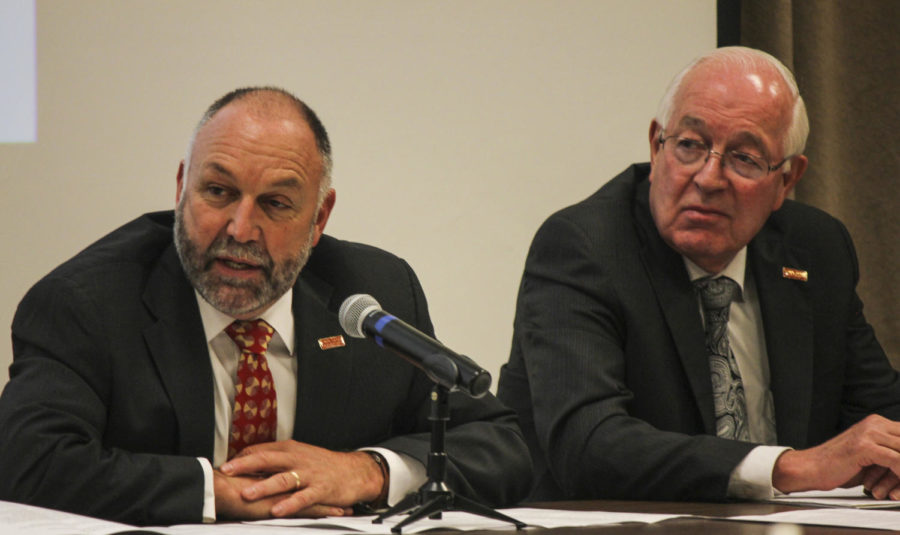Regents approve new business program, Forker renovation planning
“I expected we would grow, but nobody knew we would grow this much,” President Leath said at the GSB open forum Oct. 29. Students were given the opportunity to ask questions to administrators regarding increased enrollment.
February 6, 2015
The new master of business analytics program and a request to proceed with planning renovations to Forker Hall were both approved Feb. 5 by the Iowa Board of Regents.
The board met this week in Cedar Falls and unanimously approved both items and received updates on each regent university’s maintenance, the efficiency study and an admissions index study that standardized the way Iowa students can apply to all of Iowa’s public universities.
The University of Iowa and Iowa State University both proposed new business analytics programs, both of which were approved, and shared a collaborative effort. Students can take up to nine credits in either program to count toward the other.
The program deals with “big data” and provides training in business process analysis, predictive modeling, fraud detection, risk management and more.
“I’ve gotten … an enthusiastic perception from business people from across the state [because of] a shortage of 140,000 to 190,000 workers with the skills in the big data area,” said David Spalding, dean of the College of Business, at the Education and Student affairs.
The program is anticipated to have 20 students enrolled in the first year — planned to be fall 2015 — and up to 70 in the seventh year. The expected program cost for the first year at Iowa state is about $301,000.
The College of Human Sciences identified about 6,250 square feet of poor-quality and underused space in the Forker Building to be renovated. The improvements would create additional faculty offices, restrooms and provide a fully automatic fire sprinkler system throughout the original 1940 portion of the building.
The building, which is now the home to the Department of Kinesiology, was originally used as a women’s physical education center, said Warren Madden, senior vice president for business and finance. The project will cost about $5 million.
The board also approved the plan for a revised standard Regents Admissions Index, based off of a recommendation Deloitte Consulting provided in a business case as part of the efficiency study.
The original admission requirement included a four-part equation, including high school GPA, performance on the ACT or SAT, the number of core subject areas taken in high school and a class ranking.
More high schools around Iowa are turning away from providing a class rank, said regent Diana Gonzalez, and anyone who receives a 245 automatically gains admission. Deloitte’s recommendation was to create an online portal where students could apply to all three regent universities in one application.
The new admissions index equation combines students’ ACT score multiplied by three, high school GPA multiplied by 30 and the amount of core courses taken multiplied by five to equal 245.
The new balance, Gonzalez said, is to put more weight on the amount of core courses taken to balance not using the high school ranking.
The new calculation will be implemented for the entering freshman class of summer and fall 2016.
ISU President Steven Leath gave updates on Iowa State’s new initiatives — such as the ISU4U agreement — and methods on dealing with the enrollment growth.
The ISU4U agreement, a deal made between Iowa State and King and Moulton elementary schools in inner city Des Moines, allows students at the schools the chance to earn free tuition at Iowa State if they meet certain requirements.
“It’s aimed at making a college education more affordable, but it’s really more than that,” Leath said. “These two schools represent some of the most diverse student bodies in the entire state. Students there face some very difficult socio-economic challenges and attending college can be difficult or even impossible for them to attain.”
The deal, Leath said, is also beneficial to ISU students.
“Our teaching students can participate in teaching programs in inner city Des Moines and teachers here can better prepare our students to teach in these schools,” he said.
Leath shared a few of Iowa State’s methods in dealing with the increased enrollment, including expanding testing center hours so students don’t have to wait in line, adding a physician to Thielen Health Center, adding three CyRide buses this semester and another five next semester, expanding university housing and conducting a flow-of-pedestrian-traffic study to make traveling through campus easier.
A flipped classroom initiative, where instructors use a combination of lecture and online modules, is planned to expand in the coming year. The university awarded one-time grants to instructors to “flip” 81 courses to a combination of interaction and online.
“We use our online resources for instruction and we used our class time for more facilitated discussion, hands on learning, personalized approaches to faculty-student interaction,” Leath said. “This allows us to do a much better job with our large student body.”

















